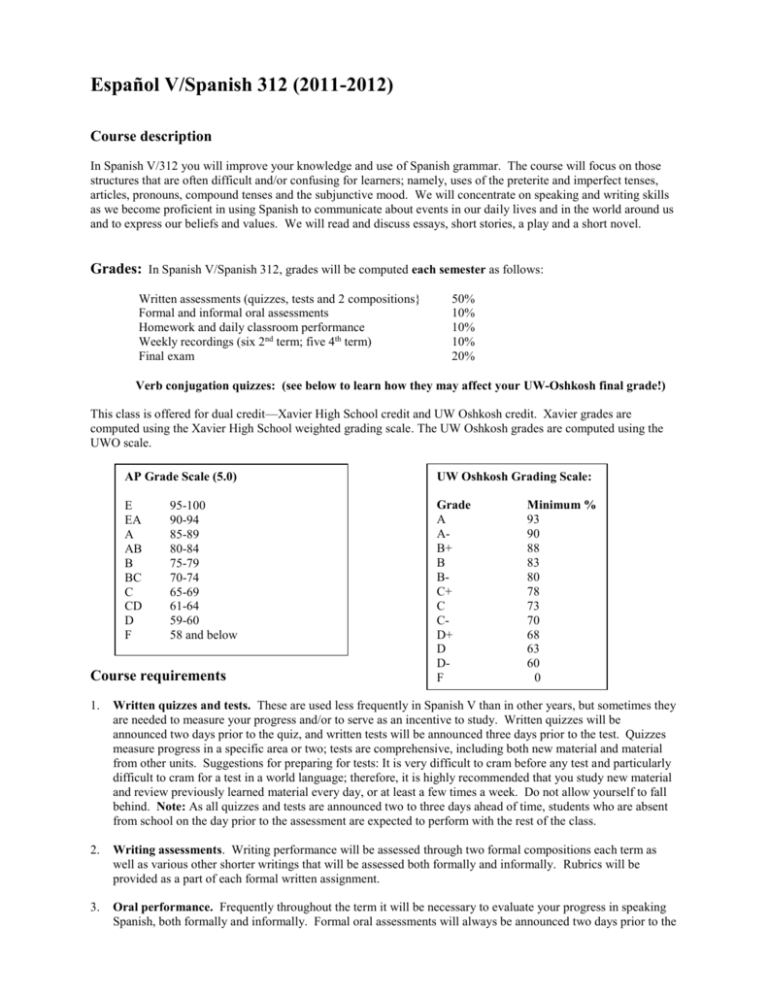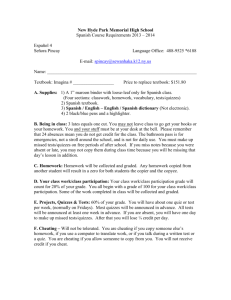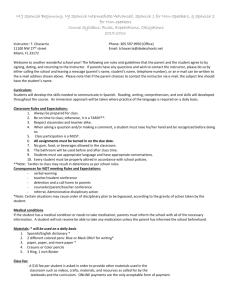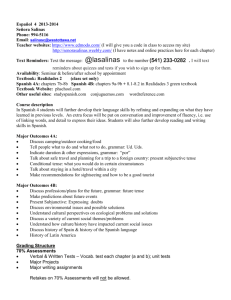Español III*1999
advertisement

Español V/Spanish 312 (2011-2012) Course description In Spanish V/312 you will improve your knowledge and use of Spanish grammar. The course will focus on those structures that are often difficult and/or confusing for learners; namely, uses of the preterite and imperfect tenses, articles, pronouns, compound tenses and the subjunctive mood. We will concentrate on speaking and writing skills as we become proficient in using Spanish to communicate about events in our daily lives and in the world around us and to express our beliefs and values. We will read and discuss essays, short stories, a play and a short novel. Grades: In Spanish V/Spanish 312, grades will be computed each semester as follows: Written assessments (quizzes, tests and 2 compositions} Formal and informal oral assessments Homework and daily classroom performance Weekly recordings (six 2nd term; five 4th term) Final exam 50% 10% 10% 10% 20% Verb conjugation quizzes: (see below to learn how they may affect your UW-Oshkosh final grade!) This class is offered for dual credit—Xavier High School credit and UW Oshkosh credit. Xavier grades are computed using the Xavier High School weighted grading scale. The UW Oshkosh grades are computed using the UWO scale. AP Grade Scale (5.0) UW Oshkosh Grading Scale: E EA A AB B BC C CD D F Grade A AB+ B BC+ C CD+ D DF 95-100 90-94 85-89 80-84 75-79 70-74 65-69 61-64 59-60 58 and below Course requirements Minimum % 93 90 88 83 80 78 73 70 68 63 60 0 1. Written quizzes and tests. These are used less frequently in Spanish V than in other years, but sometimes they are needed to measure your progress and/or to serve as an incentive to study. Written quizzes will be announced two days prior to the quiz, and written tests will be announced three days prior to the test. Quizzes measure progress in a specific area or two; tests are comprehensive, including both new material and material from other units. Suggestions for preparing for tests: It is very difficult to cram before any test and particularly difficult to cram for a test in a world language; therefore, it is highly recommended that you study new material and review previously learned material every day, or at least a few times a week. Do not allow yourself to fall behind. Note: As all quizzes and tests are announced two to three days ahead of time, students who are absent from school on the day prior to the assessment are expected to perform with the rest of the class. 2. Writing assessments. Writing performance will be assessed through two formal compositions each term as well as various other shorter writings that will be assessed both formally and informally. Rubrics will be provided as a part of each formal written assignment. 3. Oral performance. Frequently throughout the term it will be necessary to evaluate your progress in speaking Spanish, both formally and informally. Formal oral assessments will always be announced two days prior to the assessment. Suggestions for preparing for oral assessments: Studying vocabulary should help a lot; however, a successful oral assessment is mainly the result of practice during class conversations and activities. A successful oral assessment will include proper pronunciation, grammatical proficiency appropriate for a fifthyear student, sufficient and appropriate content, and confidence. In addition to oral assessments, students will turn in eleven recorded out-of-class conversations to improve overall oral fluency. 4. Homework. Students are required to present, and on most days turn in, homework assignments at the beginning of class. Homework must be completed before class begins. Failure to present the completed homework assignment will result in a homework grade of zero for the day. Late homework may not be done during class; however, if it is completed accurately outside of class and turned in before we complete the unit in which it is assigned, a student will earn up to 65 percent of the points possible for the assignment. Homework that is not completed and turned in within the designated time will remain at a zero. Unannounced or pop quizzes count as part of a student’s homework grade—expect them whenever a homework assignment is not written. 5. Classroom performance/use of Spanish. Students are expected to participate actively and cooperatively IN SPANISH during class conversations and activities. It is also expected that students will listen attentively when anyone else—teacher or student—is speaking. It is important to remember that all students must feel free to voice their ideas and opinions without interruption. Personal attacks or criticisms will not be allowed. 6. Final exam. Each semester ends with a comprehensive written exam, which counts as 20 percent of a student’s grade for that term. 7. Verb conjugation quizzes. In order to ensure that students are well prepared for advanced courses in Spanish, a conjugation quiz will be given three times during the semester. These quizzes will include verb conjugations in the present indicative tense, the present subjunctive, the preterit indicative and the imperfect subjunctive. The first quiz will be given at the beginning of the semester and the second will be given at midterm. The grade on these first two quizzes will not count toward the calculation of the final grade for the course. However, the grade for the third test, to be given at the end of the semester, will affect the final grade for the course according to the following policy: A score of 91% or better on the third quiz will not affect the final grade for the course. If the student achieves between 90% and 81% on the third quiz, the final grade for the course will be lowered by one grade level (for example, the final grade will go from an A to an A- or from a B- to a C+). If the student achieves between 80% and 71% on the third quiz, the final grade will be lowered by two grade levels (for example, from an A to a B+ or from a B- to a C). If the student earns 70% on the third test, the grade will be reduced by three grade levels (for example from an A to a B or a C to a D). If the student produces less than 70% of the correct conjugations, the final grade for the course will be F, regardless of any other coursework completed during the semester. Calculation of UW-Oshkosh Final Grade Based on Conjugation Quiz: 100–91% 90–81% 80–71% 70% Less than 70% Will not affect final grade for course. Final grade will be reduced by one grade level (ex., A to A-) Final grade will be reduced by two grade levels (ex., A to B+) Final grade will be reduced by three grade levels (ex., A to B) Final grade will be F Attendance Language learning is a cumulative process; therefore, regular attendance is expected. If you are not in class, you are not improving your language skills. You are asked to limit absences for music lessons (no more than three lessons per term will be considered excused), counselor visits, doctor and dentist appointments, etc. You are expected to make up the work you miss during these appointments. You may make up work that is missed during excused absences. If the absence is planned, see me prior to the absence and I will work with you to devise a plan to complete work as well as set appropriate deadlines. If the absence is unplanned, check with me regarding make-up work. Since so much class time is devoted to practicing language skills, it is likely that make-up work will include more than just the homework for that day. It is your responsibility to complete all of the required work. Assignments missed due to absence must be made up in a timely fashion—normally, one day for each day of school missed. Failure to turn in make-up work by that time earns a zero. Assessments, quizzes and tests missed during an absence must be made up prior to a planned excused absence (or have an alternate plan worked out with me) and within three days of your return to school after an unplanned excused absence. Failure to do so will result in a zero for the quiz or test in question. Exceptions may be made but must be discussed with me prior to the deadlines stated above. Materials Bring to class every day: textbook; paper; a 3-ring binder with dividers for keeping and organizing notes, handouts and homework; blue or black pens; a checking pen or pencil in a color other than blue or black; pencils; and one low-odor dry-erase marker. A good Spanish-English dictionary is recommended. Expectations: Be responsible—earn and show respect: 1. 2. 3. 4. Arrive on time with all needed class materials. Please use the restroom before class starts—continuous requests to use the restroom during class are disruptive to learning. No food or beverages (other than water in a clear bottle) in the classroom at any time—Please be considerate and fill your water bottle before class starts—you will not be allowed to leave class to do so until we have individual work time, and that will not be every day. Show respect at all times—for yourself, your classmates, your teacher, the classroom and its contents. The rule is SPANISH ONLY. Work on only Spanish at all times during class unless I give you permission to do something else. Work done for other classes without permission becomes mine—permanently, not just until the end of class. Failure to meet any of the above expectations will result in the loss of the corresponding honor point and possibly the loss of credit for the day. Serious infractions will be dealt with individually. Textbooks: Conversación y repaso, Seventh Edition, Copeland, Kite and Sandstedt, Holt (2001). Don Quijote de La Mancha (adapted for intermediate-level readers). Don Juan Tenorio. Retorno a la libertad. Syllabus: Semester 1 Term 1: Pretest. Grammar review and expansion: Pronunciation, spelling, punctuation, accentuation. Review of the present, preterite, imperfect, future and conditional tenses. Uses of preterite and imperfect. Future and conditional of probability. Repaso: (Topics determined by the Pretest) Conversación y repaso: Unidades 1 y 2, Orígenes de la cultura hispánica: Europa y América (the opening dialog along with associated vocabulary, cultural notes, comprehension and personalized questions, conversational and listening activities). Vocabulario diario: Lecciones 1-4. Readings: “Lecciones de inglés” “El español en Tenochtitlán” Begin Don Quijote de la Mancha (adapted for intermediate readers). Composition: Reflection on language learning. Term 2: Grammar review and expansion: Progressive and perfect tenses. Passive voice and alternatives. Forms of subjunctive tenses. Repaso: (Topics determined by the Pretest) Conversación y repaso: Unidades 4 y 5, Aspectos de la familia; El hombre y la mujer en la sociedad hispánica (the opening dialog along with associated vocabulary, cultural notes, comprehension and personalized questions, conversational and listening activities). Vocabulario diario: Lecciones 5-7. Reading: finish Don Quijote de la Mancha (adapted for intermediate readers) Composition: Verb story. Recorded conversations: Six. Mid-term exam: January 16. Semester 2 Term 3: Grammar review and expansion: Uses and omissions of definite and indefinite articles. Pronouns—subject, prepositional, direct object, indirect object, reflexive. More uses of “se” Relative pronouns. The subjunctive. Verb conjugation quizzes 1 and 2. Vocabulario diario: Lecciones 8-10 Reading: A Play in a Day (or two): Don Juan Tenorio. Begin background for Retorno a la libertad. Actividad oral y escrita: El arte en el mundo hispánico Term 4: Grammar review and expansion: The subjunctive. Sequence of tenses. Si clauses. Verb conjugation quiz 3. Conversación y repaso: Unidad 8, Los movimientos revolucionarios del siglo XX (the opening dialog along with associated vocabulary, cultural notes, comprehension and personalized questions, conversational and listening activities) Vocabulario diario: Lecciones 11-12. Reading: Retorno a la libertad. Composition: Compare/contrast Retorno a la libertad and La historia oficial. Recorded conversations: Five plus Self-evaluation of self-recording. Final exam: May 23.


